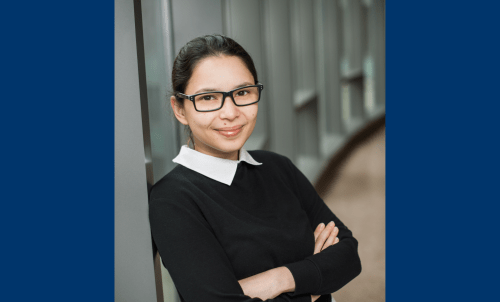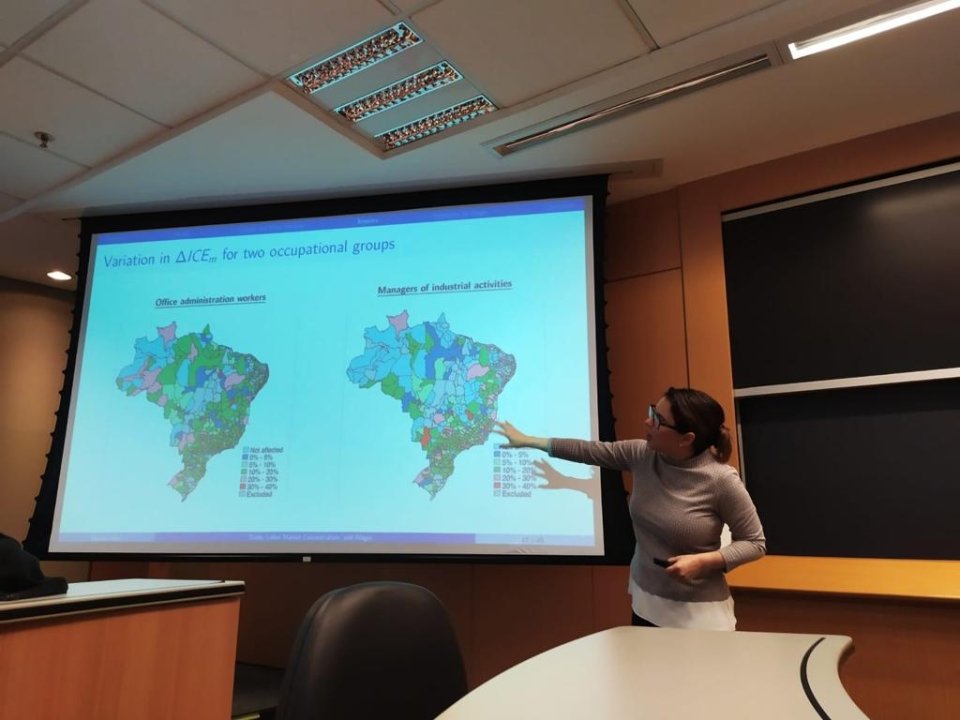The trade and development economist helping make markets more efficient in Latin America and beyond
Incoming FAS faculty member Mayara Felix studies how international trade and market-oriented policies can improve the lives of everyday people in developing countries.

Every year, Yale’s Faculty of Arts and Sciences hires dozens of exceptional scholars in academic departments across the sciences, humanities, and social sciences. This series profiles six of the faculty joining the FAS in the 2024—25 academic year, highlighting their academic achievements, research ambitions, and the teaching they hope to do at Yale. Learn more about the incoming ladder faculty and multi-year instructional faculty joining the FAS.
“I think it’s more important today than ever to understand how developing countries could leverage trade and access to global markets to grow,” says Mayara Felix, an expert on international trade and economic development and new member of the Faculty of Arts and Sciences.
Her research focuses on developing, middle-income countries such as Brazil, Colombia, and Indonesia. These countries face challenges to their growth, says Felix, but also have considerable state capacity and the opportunity to address economic obstacles with evidence-based policy.
Felix joins the FAS as Assistant Professor of Economics, with a joint appointment in the Jackson School of Global Affairs.
“There’s a lot of inequality in these countries, and there’s a lot of poverty. But there’s also plenty of richness in them, and an actual role for the state,” Felix says. The governments in these countries have pursued various policies to increase economic growth, and she wants to better understand what works and what doesn’t.
A sequence of graduate courses in international economics helped her realize “the incredible power that international trade and globalization have to change people’s lives, especially those in low- and middle-income countries,” she says. That realization prompted her to specialize in economic development and international trade so that she could “focus on a corner of research that seeks to understand problems and propose solutions to issues faced by low- and middle- income countries through the lens of market forces.”
The seed of Felix’s interest in these questions was planted early. Growing up in Brazil in the mid-nineties in an era of trade liberalization, she didn’t understand why some communities had so much wealth while others were just scraping by.
“I grew up in a poor community in Northeast Brazil, and in that context I was only able to understand the issues around me through a zero-sum lens,” she recalls. As Brazil opened its economy to the world, she thought the only solution to poverty in her country would be to “take from the rich and give to the poor.” But by high school, she says, “I had matured enough to understand that the world is complex. I needed more knowledge and more tools—not only to better see the issues around me, but to know how to come up with solutions.”
Felix’s desire to understand and solve economic problems led her to explore economics as an undergraduate. She became hooked on the field after a class on game theory at Mount Holyoke College, and then went on to earn her PhD in Economics from MIT.

Now Felix studies policies intended to improve market efficiency, such as import tariff reductions, free trade agreements, and outsourcing. She’s especially intrigued by the ways even well-designed policies can have unexpected consequences, and how firms respond to policies that affect their ability to compete with other firms.
One such policy outcome is a market failure called market power, which Felix says is often a good reason for lawmakers to intervene. “Policy may need to guarantee free competition access to one place or reduce the barriers of entry to another,” she explains, so that markets can work more efficiently and consumers aren’t forced to pay sky-high prices.
Externalities are another important factor that may be addressed by economic policy, Felix points out, particularly in developing countries where there may be a huge economic benefit to doing so. “There are positive externalities like education; if you’re educated, you’re going to positively affect other people in your life. But whoever educated you doesn’t get to benefit from that economically, so that education is under-provided in the private sector. That means the government should provide it. Similarly, pollution is an example of a negative externality. There is a big rationale for governments to tax pollution and things like that.”
She wants her students to develop a strong understanding of when and why countries might need to use policy to intervene in markets. “In both the Economics Department and the Jackson School, students are really connected with policy,” she says. She plans to use her co-appointment to teach classes that allow students to engage critically with economic policy around the world. “I’d like to teach a master’s class at Jackson where we look at the intersection of trade and development and ask, ‘where across the globe have we seen these types of policies, and have they been successful or unsuccessful? What does policy evaluation look like in this space?’”
Building students’ understanding of the real-world implications of their work will be a core element of Felix’s classes. She wants students to be able to correctly apply what they learn after graduation, and to make well-informed policy decisions. “Imagine you’re working for the United Nations, the World Bank, or the International Monetary Fund, and you want to be able to critically assess a policy they’re trying to do. What are some principles that you need to guide yourself by to be able to give good feedback on those policies?”
Felix is also looking forward to this fall’s Cowles Trade Days conferences, hosted by the Cowles Foundation for Research in Economics and the Department of Economics. Felix presented her research on Colombian tariff quotas last year, and plans to speak about the reallocation effects of domestic outsourcing at the September 2024 conference. She highlights its value as a place to discuss early research with peers and students from across disciplines. “This is an opportunity for us to present work to our peers and get great feedback early on. And since this is our home environment, we get to expose our students to what early-stage research looks like. It’s pretty incredible.”
Felix is excited to continue getting to know not only her new departments, but the city of New Haven, too. “It’s very diverse, and a very manageable version of a big city,” she says of her new home. After completing her PhD in Massachusetts, she had been set on living in a bigger city like New York or São Paulo—but everything worked out even better than Felix imagined.
“I am so, so happy that I ended up here,” she says. “I think it’s my dream placement.”